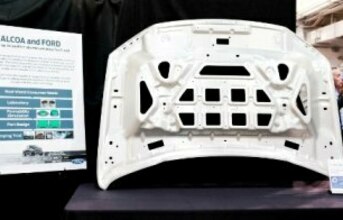
The increased formability of Micromill aluminum makes it easier to shape into intricate forms, such as the inside panels of automobile doors and external fenders. The increased material strength allows for the use of thinner aluminum sheet without compromising dent resistance.
Micromill is the fastest, most productive aluminum casting and rolling system in the world combining multiple technologies into a streamlined production system. A traditional rolling mill takes around 20 days to turn molten metal into coil; Micromill does it in just 20 minutes.
Collaboration covers current and future Micromill alloys
Ford will begin using Micromill material in 2016 F-150 production in the fourth quarter of 2015, and plans to increase its use over the next several years on a range of vehicle components and future platforms. It is projected Ford's use of Micromill material on its vehicles will more than double from 2016 to 2017.
Alcoa's advanced alloys offer Ford the formability and strength required for greater flexibility in designing vehicles using complex parts. By using the highly formable material, parts constructed of multiple pieces can be manufactured as a single part - reducing complexity and assembly time. Target applications for the material include critical strength structural parts as well as exterior panels that must meet strict surface quality requirements.
Aluminum alloy produced using the Micromill process has already been validated by Ford engineers to ensure it meets the stringent requirements for producing high-quality parts, especially the kinds of complex structures that make up F-150.
"The door inner is one of the most difficult parts in automotive stamping," said Peter Friedman, Ford global manager of structures and stamping, Research & Advanced Engineering. "The ability to produce an alloy using Alcoa's Micromill technology to make that part is a real statement for how this process can benefit the automotive industry and Ford in particular.
"This technology will help Ford to produce the type of vehicles our customers want," added Friedman. "We believe the technology can be used to develop new alloys that will improve our ability to form complex parts, which will help in both design and efficiency."
The joint development agreement between Alcoa and Ford will further expand the existing suite of automotive alloys produced by Micromill technology for use on Ford vehicles. New alloys will improve design flexibility on lightweight parts and provide better vehicle performance - helping Ford produce the types of quality, lightweight vehicles customers want.
END


























